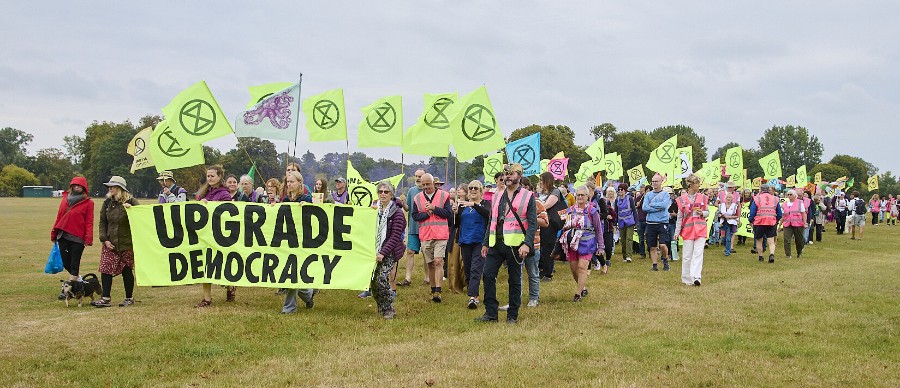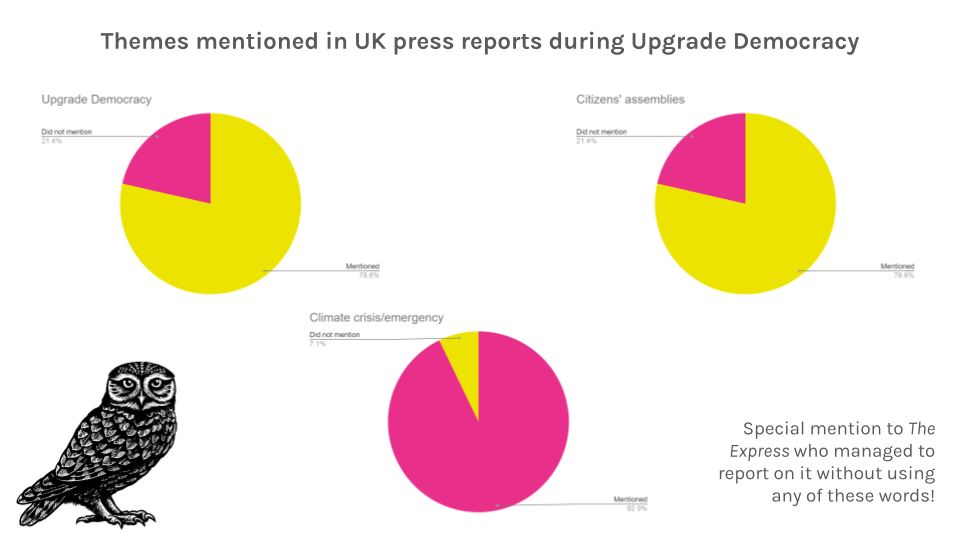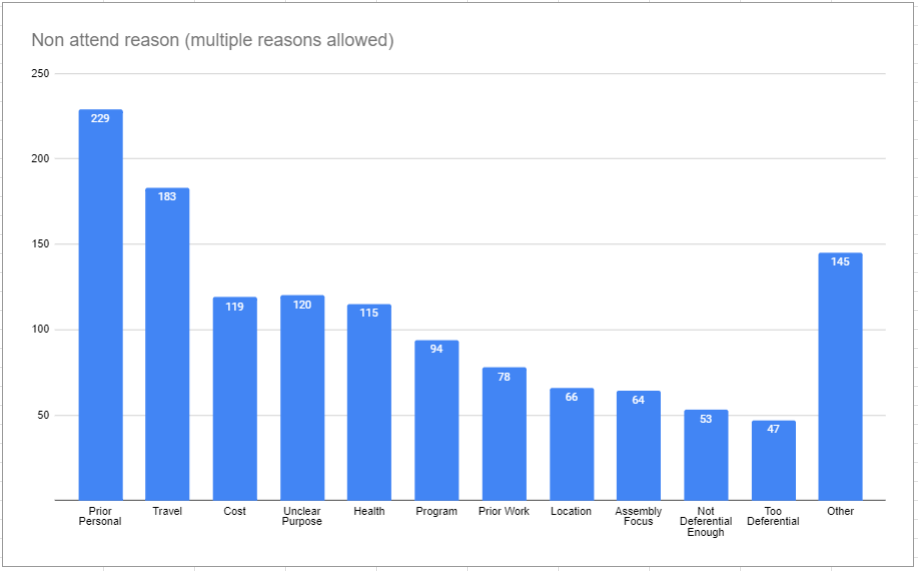UD Feedback and Learning
Feedback was accepted from individuals, and from teams/circles. The feedback form is now closed.
The feedback survey went out immediately after Upgrade Democracy to the action support and XRUK mailing lists on Action Network, followed by a post linking to it on the Rebellion Broadcast which was cascaded through the regions and nations.
If you are interested in reading the anonymised 950+ responses, please contact actionsupport@extinctionrebellion.uk (summary as at 26/9/24)
So what did we achieve?
The goal of the Action was 'to get Upgrade Democracy and Citizens' Assemblies into the mainstream media.
We acheived far higher levels of media interest than we have recently, with a relatively small number of rebels.
Note: several papers ran up to a half a dozen stories (Daily Mail, The Telegraph, The Sun, The Express). Other coverage not included here: Al Jazeera English, Agence France-Presse, Agencia EFE, LBC Matthew Wright, The Times, The i, The Reading Chronicle, Maidenhead Advertiser, etc.
-
The Sun - idiots target the King
-
MailOnline “Exclusive” - XR plan to storm Windsor Castle
-
Big Issue op-ed - XR’s real plan
-
Morning Star op-ed - why our democracy needs an upgrade
-
Euronews - we will be targeting the broken system not a person
-
ITV Good Morning Britain - debate with royal correspondent
-
The Guardian - Olympic gold medalist joins activists
-
The Independent - no plans to storm the castle
-
Charles & Camilla visit (video)
-
The Telegraph - report on day one (including a lovely food review)
-
The Telegraph - report on day two
-
The Express - XR delivers post to the King
-
Ascot, Windsor & Eton Express - XR ‘proved people wrong’
-
BBC Online - wrap up
Photos and livestream
Fundraising
We wanted the Action to be self-funding. We raised over £70,000 with a matched funding campaign and through donations on the ground at the event.
You can still donate to the crowdfunder here
Massembly
450 people came together in-person and online to deliberate on the question: "How might we take meaningful steps to upgrade democracy?"
The event was intended to provide participants with real-life experience of participatory deliberative processes and demonstrate their value and legitimacy, increase understanding and awareness of the opportunities for democratic upgrade, and so build support for XR's Third Demand.
We explored the challenges with our existing system, debated potential improvements and alternatives, and came up with new ideas. Initial summary of results is here
Public engagement
Survey board discussion with nearly 250 members of the public at Upgrade Democracy found that the overwhelming majority expressed deep concern about the climate and nature crisis:
-
81% are terrified or seriously concerned about the current environmental situation.
-
Only 5% believe governments are effectively addressing the crisis.
-
75% think government efforts are either hopeless or nearly so.
-
97% believe that ordinary people should have a say in tackling these issues through citizens' assemblies.
Volunteering
Our We are all Crew goal was to have every attendee volunteer for at least one shift. With approximately 600 attendees, we had over 400 signup as crew beforehand with more volunteering on the day.
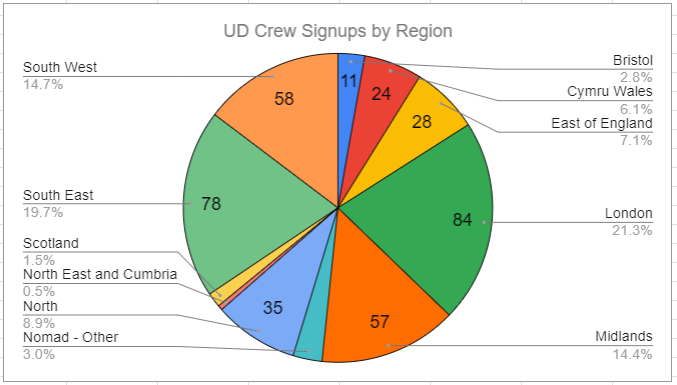
Campsite
Some 260 campers registered (around 300 people). We counted about 245 tents over the weekend. 18 Campervan spaces for rebels with access needs were booked and 27 rebels asked XR to supply a tent or camping equipment.
The campers were overwhelmingly positive about the regenerative experience of spending time together in a safe, well organised campsite. Many suggested we should consider an annual XR camp!
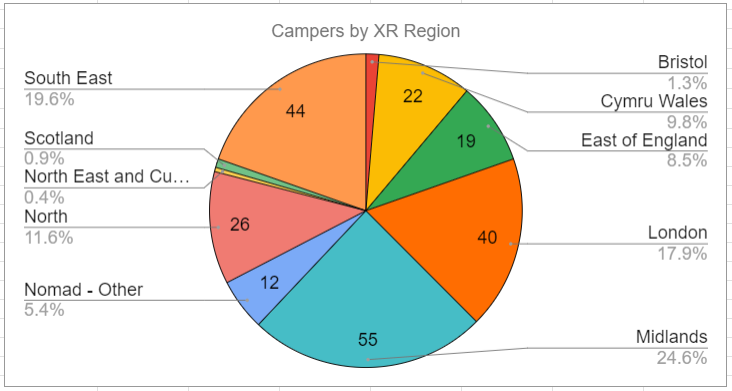
What was your feedback (attendees)
Of those that attended, almost half completed a feedback form. These are some of the key themes from responses:
What went well
-
Organisation and Logistics: Participants appreciated the overall organisation of the event, from the campsite setup to the coordination of actions and activities. Participants felt well cared for and enjoyed smooth running of activities.
-
Community and Atmosphere: The sense of community, togetherness, and positive atmosphere at the event were highlighted as key factors contributing to its success.
-
Food and Catering: The quality and variety of food provided at the event received high praise from participants.
-
Massembly: The Mass Assembly was a standout feature, with participants finding it engaging, informative, and empowering.
-
Creativity and Theatrical Elements: The creative and theatrical aspects of the event, including visuals, props, and performances, were well-received and added to the overall experience.
-
Outreach and Engagement: Positive interactions with the public, engaging conversations, and effective outreach efforts were noted as successful aspects of the event.
-
Press Coverage: The event's success in garnering press coverage and media attention was seen as a positive outcome.
-
Training and Workshops: Participants valued the training sessions, workshops, and educational opportunities provided during the event.
-
Regenerative Culture: The regenerative culture, inclusivity, and supportiveness of the event were highlighted as contributing to a welcoming and supportive environment.
-
Location and Visual Impact: The choice of location, visual impact of actions, and overall aesthetics of the event were appreciated by participants.
What could be better
-
Low Attendance: Many participants noted the disappointment in the low numbers of attendees at the event, which may have impacted the overall impact and effectiveness of the actions.
-
Communication and Clarity: Several comments highlighted issues with communication, clarity of instructions, and understanding the purpose or goals of the event. This included confusion around the messaging, lack of clear objectives, and challenges with technology like the Pol.is platform.
-
Logistical Challenges: Feedback mentioned logistical challenges such as the distance between locations, issues with transportation, lack of clear signage or maps, and difficulties with facilities like toilets and water provision. Some crew volunteers had difficulty with food queues whilst on duty.
-
Diversity and Inclusivity: Concerns were raised about the lack of diversity in terms of demographics, representation, and outreach. Some participants felt that the event did not attract a broad enough range of people or engage with different communities effectively.
-
Technical and Operational Issues: Participants experienced technical glitches with platforms like Pol.is, challenges with shift scheduling and coordination, and issues with the overall organisation of activities and timings.
-
Environmental Impact: Some feedback touched on environmental concerns, such as the use of single-use plastics, water consumption, and noise pollution from aircraft.
-
Public Perception and Messaging: There were comments about the public perception of the event, the effectiveness of messaging, and concerns about the alignment of actions with broader goals like climate justice and democracy.
-
Health and Safety: Feedback included mentions of health and safety issues, such as concerns about food quality, accessibility for individuals with disabilities, and the impact of weather conditions on participants.
-
Engagement and Outreach: Participants expressed the need for better engagement strategies, more effective outreach to the public, and clearer communication of the event's purpose and objectives.
-
Community and Collaboration: Some feedback highlighted the importance of community involvement, collaboration between different groups and roles, and the need for a more cohesive and inclusive approach to organising events.
-
Future Direction and Strategy: Some participants shared thoughts on the future direction of XR, the need for more radical leadership, and strategies to increase engagement and impact. Suggestions included focusing on collaborative democracy, electoral reform, and innovative campaigns.
What was your feedback (non-attendees)
Over 650 feedback forms were completed by non-attendees. These are some of the key themes from responses:
What went well
-
Publicity and Media Coverage: Many participants mentioned the importance of publicity and media coverage in raising awareness and getting the message across. Positive media coverage was highlighted as a success factor.
-
Organisation and Planning: Participants appreciated the organisation and planning that went into the event. They mentioned aspects such as clear messaging, well-run logistics, and effective communication.
-
Positive Atmosphere: The overall positive and peaceful atmosphere of the event was noted by many. Participants mentioned the joy, creativity, and sense of community that was present.
-
Focus on Upgrading Democracy: The emphasis on upgrading democracy and promoting citizens' assemblies was a key theme that resonated with participants. They appreciated the educational aspect and the focus on democratic processes.
-
Engagement and Participation: The event encouraged engagement and participation, both in-person and online. Participants valued the opportunities to be involved and contribute to the cause.
-
Symbolism and Visuals: The use of symbolism, colourful visuals, and creative actions, such as costumes and banners, was highlighted as effective in conveying the message and attracting attention.
-
Community Building: The event was seen as a way to bring people together, build community, and strengthen the movement. Participants appreciated the sense of solidarity and shared purpose.
-
Peaceful Protest: The peaceful nature of the event was a common theme, with participants noting the importance of non-violent actions and positive messaging.
-
Impact and Awareness: Many participants felt that the event successfully raised awareness and had a positive impact, even if they were not able to attend in person. The event was seen as a way to keep the issue in the public eye.
What could be better
-
Location and Travel: Concerns about the location being difficult to access, especially for those travelling from far away regions. Some felt it was too London-centric and not inclusive of other areas.
-
Messaging and Clarity: Feedback suggests confusion around the purpose and messaging of the event, with some feeling that the focus on upgrading democracy and targeting royalty was unclear or off-target. Others wanted clearer communication about the purpose and goals of events
-
Publicity and Media Coverage: Many participants expressed disappointment in the lack of mainstream media coverage and felt that more publicity was needed to reach a wider audience.
-
Attendance and Impact: Some felt that the event did not have a significant impact due to low attendance and minimal disruption, leading to concerns about the effectiveness of the action.
-
Diversity and Inclusion: Criticisms were raised about the lack of diversity and inclusivity within XR, with concerns about the movement being perceived as too middle-class or not reaching a broader demographic.
-
Engagement with Royalty: Mixed opinions on the approach of targeting or engaging with royalty, with some feeling it was inappropriate or ineffective given the monarchy's limited political influence.
-
Logistical Issues: Feedback highlighted logistical challenges such as lack of clear instructions, issues with accommodation, and difficulties in accessing essential information for participation.
-
Focus on Climate Change: Some participants expressed a desire for XR to maintain a strong focus on environmental issues and direct action, rather than branching out into other areas like democracy or monarchy.
-
Desire for stronger focus on NVDA
-
Clearer position on aristocracy / monarchy there were calls for a clearer communication around XR not supporting the monarchy, aristorcacy and established systems of power.
-
Accessibility & Inclusion some were unaware of the support available to facilitate greater access to events. Especially those with health issues or live far away
-
Handling of disagreements Some expressed frustration and/or disappointment with the way disagreements about event purpose, planning or messaging were dealt with.
Reasons for non-attendance
We asked all those who didn't attend what their main reasons were.
-
89% = Prior Personal, Travel, Cost, Unclear Purpose, Health, Prior Work, Location, Assembly Focus, Not deferential enough, Too deferential.
- 11% = Other (which when you analyse teh text actually includes many of the above categories again)
For those who gave 'other' as their reason, here are the top themes (several of which replicate the categories above):
-
Tech Issues: Some individuals faced challenges with technology or communication, which may have impacted their ability to engage with the event.
-
Individual Action: Some participants expressed interest in initiatives like Compass for democracy and Zero Hour for climate and nature, indicating a preference for more targeted and impactful actions.
-
Logistical Challenges: Issues such as lack of nearby accommodation, transportation difficulties, and the need to bring supplies for extended travel posed barriers for attendance.
-
Lack of Clarity and Communication: Concerns were raised about the clarity of the event's purpose, messaging, and logistics, which may have contributed to confusion and disinterest.
-
Diversity and Inclusivity: Some individuals highlighted the importance of diversity and representation within XR, expressing concerns about the movement's direction and inclusivity.
-
Health and Family Responsibilities: Health issues, family commitments, childcare needs, and other personal responsibilities were cited as reasons for not being able to attend.
-
Disillusionment and Burnout: Some participants expressed feelings of disillusionment, burnout, or a lack of faith in XR's effectiveness, leading to disengagement from the event.
-
Political and Social Concerns: Criticisms of XR's strategies, lack of impact, and alignment with certain political or social issues were mentioned as factors influencing attendance decisions.
-
Timing and Scheduling: Conflicts with personal schedules, holidays, school terms, and other commitments affected the feasibility of attending the event.
-
Accessibility and Inclusivity: Concerns about physical disabilities, age-related limitations, and the inclusivity of event activities were raised as barriers to participation.
Attendance by Region
Understandably, for those Regions where travel to Windsor was harder, a lower % attended.
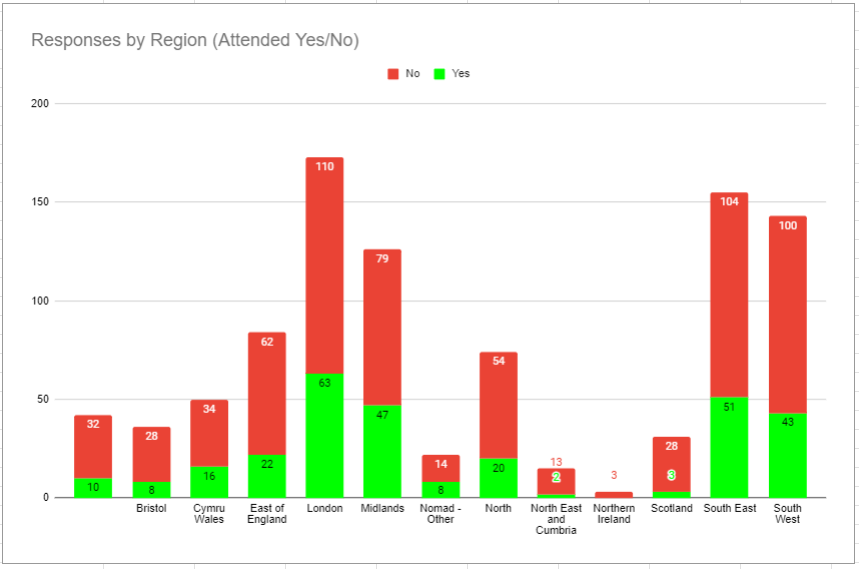
So what next
XR Teams and Circles have reviewed your feedback as well as their own thoughts and these are the highlights of plans for future events to make them even better
Note - this list is not exhaustive and is being added to as teams complete their debrief and planning processes
Systems & Cultures
Will be working on promoting the voices of marginalised and under represented groups through engaging in dialogue with event planners.
Roadtaking
As this circle matures, looking at delegating greater authority to Lead Roadtakers on larger marches.
Action Support Crew Recruitment
Recognising that rebels want to volunteer for more than one role at an event (will require separate forms per role but to a common format) Retain the Rebel Toolkit approach to collecting all crew recruitment in one place. Charts showing areas of greatest need and recruitment gaps.
Outreach
Our Outreach crew this time included more first-time or less experienced outreachers than before, they benefitted from our training/briefing and we hope they will continue to develop their skills. We brought survey boards to an XR UK 'rebellion' for the first time, these were sucessful at prompting conversions and we hope to make them more effective in future. We will go deeper into training around survey boards, and aim to make the 3rd panel (which makes the call to action) more contextualised for each action.
Massembly:
- Key learning was the importance of centring the event with a dedicated time slot to maximise engagement
- We will in future take steps to stagger the use of Pol.is to avoid risk of temporary overload
- For outdoor assemblies we will make more provision for seating for those who may struggle to sit on the ground for long periods
- Encourage more trained facilitators to take part.
Actions Circle - Future major event Weavers:
Continue to invite wider participation of teams though a 'Wider Wisdom' type chat group. Continue to provide weekly updates to the wider group of teams on the weaving in the run up to events. Repeat the Emergency Decision Making Team planning exercise to prepare for eventualities beforehand, as well as communicating which roles are represented and the situations they might act on.
Media, Messaging and Comms
- Ensure that UK M&M are working with action planners from the start - actions tell a story, it's vital that we are all aligned and the skills and expertise of both teams have the opportunity to shine.
- A longer runway to an action means more time to develop a story and delve into the nunce and forge connections. A short run up risks that being lost and that leading to fustration.
- Media and Messagings mandate is public comms, it's using tactics designed to get press interest and connect with people who aren't already rebels. There needs to be a reliable and consistent way of communicating with the movement that isn't a press release.
- Weavers circle get opportunity to sign off on press releases - within given time constrains - though the final decision remains with M&M as per mandate. As the Weavers should contain full representation of action planners, this ensures that there is no separation between action and message.
- Greater collab between M&M and Stewards to make sure people know who to herd journalists to.
- Use the UK Comms Plan developed by M&M to process broadcasts, emails, website and Rebel Toolkit content in advance of info going public, alongside M&M outputs. This helps to reduce message overwhelm and improves accuracy.
- For this campaign 2 channels were created (one for broadcasts, one for chat) - alongside the Rebellion Broadcast.
- A team of chat moderators is now standard for each campaign - to manage the chat channel and respond to questions, off topic threads and spammers.
UK Rebel Hive
As the widest circle of XRUK the Hive has delegated its operational power to its subcircles. However it is a key space to hear feedback from the regions and nations to then inform those circles. These are the key elements of feedback that we heard from the representatives of the regions and nations that should be considered for future actions.
- More notice of date and location. The short runway was a barrier to many people feeling they could be there, as they had already committed to other things in their lives.
- Longer lead in would also allow more opportunity to tell the story of why the action happened, and explore the themes in it. A lot of potential was missed.
- Need for stronger avenues of communication with the movement - R&N ECs had good conversations to explain the action, but they don’t speak to everyone, and it shouldn’t rely on that level of interaction
- A more intentional finish to the Massembly would have helped balance the energy of the day Managing expectations - some rebels who put a lot of time and effort into their fUNFAIR games felt they didn’t really get the prominence they deserved
- How, across the movement, do we build the hype around actions. Everyone holding roles is responsible for pushing in the same direction.
- Created a lot of FOMO from those who weren’t there, and buoyed the spirits of those who were
- Demonstrated the need for a regular opportunity to come together as a movement, to learn, be joyful and build our connections as a movement.
The Hive would like to express enormous gratitude for everyone involved in making this action happen, from the planning through to the delivery and follow up. We know how hard rebels worked, and hope you know that it is seen across the movement.

